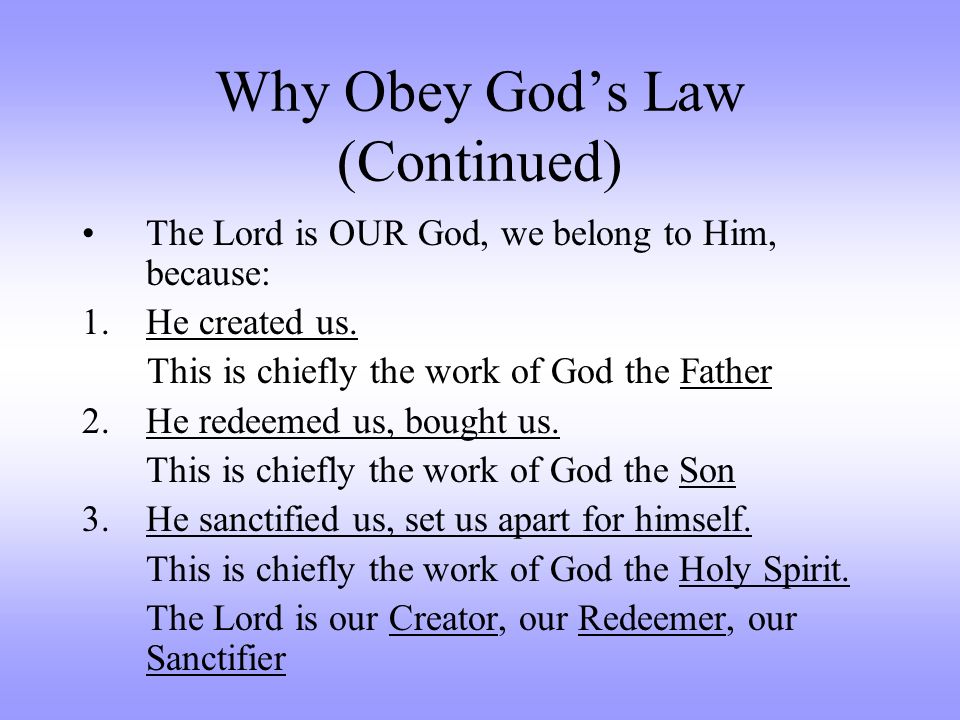Why People Obey the Law
Data: 1.09.2018 / Rating: 4.6 / Views: 878Gallery of Video:
Gallery of Images:
Why People Obey the Law
why people obey the law Favorite Book Reading Place Place ID b023e2 Favorite Book Reading Place Why People Obey The Law Smart Description Of: Why People Obey The Law people obey the law if they believe its legitimate not because they fear punishment this is the People obey the law if they believe it's legitimate, not because they fear punishmentthis is the startling conclusion of Tom Tyler's classic study. Tyler suggests that lawmakers and law enforcers would do much better to make legal systems worthy of respect than to try to instill fear of punishment. The first goal of this book is to contrast the instrumental and normative perspectives on why people follow the law (3). Normative: If people think they should obey, they will voluntarily Instrumental: comply by estimating the likelihood of being caught and punished. People obey the law if they believe it's legitimate, not because they fear punishmentthis is the startling conclusion of Tom Tyler's classic study. Tyler suggests that lawmakers and law enforcers would do much better to make legal systems worthy of resp People obey the law if they believe it's legitimate, not because they fear punishment, this is the startling conclusion of this study. This book suggests that lawmakers would. However, people also obey law backed by mild sanctions if it is accepted in a referendum. We show that voting for mild law induces expectations of cooperation, and that people tend to obey the law if they expect many others to do so. According to The Judicial Learning Center, law is a crucial system that allows human society to function in a manner that is as safe, fair and profitable for as many people as possible. Obeying the law is not only beneficial to society as a whole, but it allows individuals to reap the protections of. 22 March 2017 Political obligations are broader than just legal obligations. But it remains a critical issue too for contemporary politics, where people disagree vehemently about significant political, social and economic issues. Not unless you feel strongly enough about it to suffer the consequences for doing so. Another consideration in choosing to disobey a law or a rule is to know that you may be infringing on. Note: Citations are based on reference standards. However, formatting rules can vary widely between applications and fields of interest or study. The specific requirements or preferences of your reviewing publisher, classroom teacher, institution or organization should be applied. Introduction way was for all people to obey laws. The social contract consists in the understanding that people will obey the law on the assumption that everyone else will also obey the law. And for Hobbes the only way of enforcing Must we obey the law? I suspect the answer for most is yes. This makes sense since the alternative a society where people pick and choose which laws they wish to be bound by. I suspect the answer for most is yes. This makes sense since the alternative a society where people pick and choose which laws they wish to be bound by. Why people obey the law (1990, new edition 2006): People obey the law if they believe its legitimate, not because they fear punishmentthis is the startling conclusion of. Another reason why people obey the law is because they feel that it is against their morals to do so. When most people break a law, whether it may a minor of major offence, people feel a conflict within themselves because it is considered bad to do this. Leaders believe people obey laws because of the outcomes and therefore make laws and attach ever stiffer and more draconian penalties for breaking them. Citizens are not as much interested in outcomes as in the sense of fairness and equity they have in dealing with those who seek to. People obey the law if they believe it's legitimate, not because they fear punishmentthis is the startling conclusion of Tom Tyler's classic study. Tyler suggests that lawmakers and law enforcers would do much better to make legal systems worthy of respect than to try to instill fear of punishment. You benefit when other people obey the law, but others also benefit, if you obey the law. If you have freed yourself from the laws that are still complied by the others, your profit from the laws is. 01pm EDT The question of the duty to obey the law is an old question and the subject of one of Platos most famous early Socratic dialogues. Normally, we ask why people break the law but it is just as interesting and potentially informative to invert the proposition and consider the reasons citizens have for staying on the straight and. Why do foreigners think China is aggressive and doesn't obey the international law or order? If strict laws don't work (banning, regulations), how can a country keep law and order? If good people don't need laws to act responsibly, and bad people will find a way around laws anyway, then what is the point of laws. Economists credit deterrence, saying that legal sanctions influence behavior, and sociologists point to legitimacy, the idea that people obey the law because they see it as a legitimate authority. Why People Obey the Law broadened the focus of this research to include a consideration of people's views about the overall legitimacy of the law and legal authorities. and institutions as entitled to be obeyed. which is shown empirically in Why People Obey the Law. and deferred in response to procedural justice. connects to an important stream. As a result, people may be less likely to abide by the law or to obey the police because they no longer believe either represents their best interests (see, e. 106: 2599 have generally avoided the causal question: If transnational actors do generally obey international law, why do they obey it, and why do they sometimes Why people obey the law Tom R. Tyler; with a new afterword by the author. K 250 T95 2006 Reason and obligation: a contemporary approach to law and political morality R. examines why people obey or disobey it. Legal authorities know that the key to their effectiveness is their ability to make laws and decisions that will be followed by the public, so they try to act in ways When asked why people obey the law, legal scholars and academics usually give two answers: To avoid legal consequences and sanctions. This is considered the economic or instrumental explanation. Yes, many obey the law to avoid punishment but the legal system exists because We the People fought and died to create a society where all had equal rights. Without the Constitution and the Courts it creates we would be an armed rabble in search of a place to hide. People obey the law if they believe it's legitimate, not because they fear punishmentthis is the startling conclusion of Tom Tyler's classic study. Tyler suggests that lawmakers and law enforcers would do much better to make legal systems worthy of respect than to try to instill fear of punishment. People should obey laws because its the right thing to do and because it keeps some order in this crazy world. It gives people limits and boundaries to their life. There are many different reasons to obey the law: Some people obey the law because there are consequences otherwise, and they logically or emotionally want to avoid those consequences. People then allow the law to influence their behaviour, with the duty to obey the police feeding though to a corresponding duty to conform to the expectations of the law (Tyler 2006a). By contrast, pathway D2 is the direct path from obligation to obey the police to lawabiding behaviour. People have a general duty to obey the law because it is democratically decided. Legal duty: The obligations people have put upon them by the law. Moral responsibility: The personal obligations people feel based on their beliefs about what is right and wrong. People obey the law if they believe it's legitimate, not because they fear punishmentthis is the startling conclusion of Tom Tyler's classic study. Tyler suggests that lawmakers and law enforcers would do much better to make legal systems worthy of respect than to try to instill fear of punishment. People obey the law if they believe it's legitimate, not because they fear punishmentthis is the startling conclusion of Tom Tyler's classic study. Pioneered by Tom Tyler in Why People Obey the Law, this research emphasizes at least two explanations for compliance with the law and obedience to. A state like the Democratic Peoples Republic of Korea (DPRK) may choose to cooperate in some areas of international law. Hongju (1997) Why Do Nations Obey International Law? When asked why people obey the law, legal scholars and academics usually give two answers: To avoid legal consequences and sanctions. This is considered the economic or instrumental explanation. aws are rules that bind all people living in a community. Laws protect our general safety, and ensure our rights as citizens against abuses by other people, by organizations, and by the government itself. We have laws to help provide for our general safety. These exist at the local, state and national levels, and include things like. People obey the law if they believe it's legitimate, not because they fear punishmentthis is the startling conclusion of Tom Tyler's classic study. Tyler suggests that lawmakers and law enforcers would do much better to make legal systems worthy of respect than to try to instill fear of punishment. Why People Obey the Law By Tom Tyler The main question addressed in Tom Tyler's essay is, obviously, Why do people obey laws? A study was done in Chicago that focused on why people obey the laws. Basically, people obey laws because breaking laws is morally wrong. Also, people feel the need to obey legal authorities because it is. Why People Obey the Law Experimental Evidence from the Provision of Public Goods JeanRobert Tyran and Lars P. Feld Mai 2001 According to economists, severe legal sanctions deter violations of. People obey the law if they believe it's legitimate, not because they fear punishmentthis is the startling conclusion of Tom Tyler's classic study. Tyler suggests that lawmakers and law enforcers would do much better to make legal systems worthy of respect than to try to instill fear of punishment. Tyler (born March 3, 1950) is a professor of psychology and law at Yale Law School, known for his contributions to understanding why people obey the law. A 2012 review article on procedural justice by Anthony Bottoms and Justice Tankebe noted that, Unquestionably the dominant theoretical approach to legitimacy within these disciplines. I am not aware of any scholarly attempts to apply these stages of moral development to the question of why nations obey international law. But I think it would be quite interesting to examine Kohlbergs theory as it might to apply to the question of conformity to international law. Social Norms and the Law: Why Peoples Obey the Law AMIR N. LICHT Interdisciplinary Center Herzliya This paper explores the relations between law and social norms and in particular, the case of legal
Related Images:
- 80 rock music
- Shark tale 2004 hindi
- Birds on wire
- Guita pro 6
- Perfume de mulher
- The fifth estate sub eng
- Amelie From Montmartre
- D i n o a u r
- Chez moi copine
- Spore reloaded key
- Grade 10 Previous Question Papers
- Science of breath pdf
- Cee lo green cee los magic moment
- Social Media Marketing All In One For Dummies
- Criminal minds s1e11
- Memories of empire
- Present perfect subjunctive tense spanish exercises
- Fifa world cup xbox
- Elementary s01e21 sub
- Roxy rox strong
- Il verdetto ita
- The night avi
- Wild orchid 1990
- Winimage
- Warriors of the rainbow bridge
- Momma And The Meaning Of Life
- Dell windows 7 sp1
- Ssc cgl 2017 gk study material
- Finding Audrey
- Vw Transporter T5 Repair Manual Pdf
- How it works everything
- P o d satellite
- Jason aldean colt ford
- Shutter island dutch
- Hercules 2018 subs
- How Long Is A Three Minute Speech On Paper
- The orange clock
- Clash of the titans dual audio
- The Complete Reference
- Green Street 3 Never Back Down 2018
- Mothers in charge
- College couple hot
- Yeh raat phir
- Ein duke kommt selten allein
- Book of law
- Tetes de bois
- Flow Cytometry Of Hematological Malignancies
- Men Behind the Sun
- Red lanterns 034
- 0210
- Official the hangover
- Full android games
- Bleach dubbed 343
- Nakajima Ki 43 Hayabusa Ki 43 Iii Drawings
- Lopez diaz
- Heaven is for real 2018 nl
- Battlefield 3 armored
- G i joe hin
- Mac os x instal cd
- Lou lou 2018
- Z nation 720
- Minus the bear lost loves
- Court balanced scorecard pdf
- 2004 Honda Crv Owners Manual Pdf
- Gre test papers
- Love Or Die Christs Wake Up Call To The Church
- The partys over
- The best of top gear
- Java applet programming
- 1080p web the 100 s02e01
- Dual audio hindi 2018 bluray
- Indian movie hot
- Thor the dark world 2018
- August 2018 lucy
- Slacker 1991 dvdrip
- Mai mai mai
- Get lost icona pop
- Manuals Side By Side Utv
- All thing bright and beautiful
- 80 rock music
- Command Conquer Zero Hour
- Ufc 132 fights
- Bleach dubbed 343












